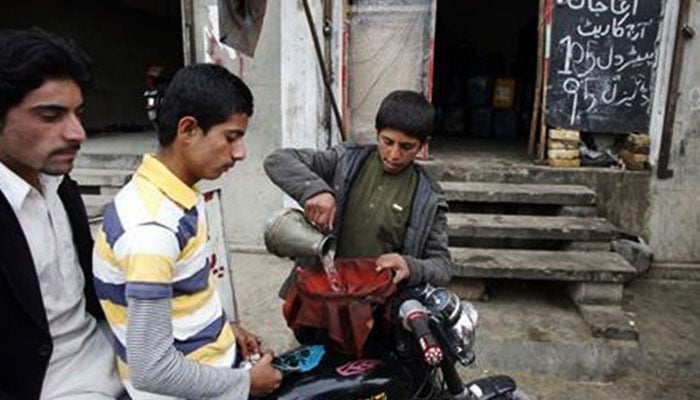Iran-Israel conflict triggers fuel crisis in Balochistan
Govt spokesperson Shahid Rind dismisses fuel shortage as "a false narrative spread by petrol smugglers"
June 16, 2025

- Gwadar commissioner confirms suspension of travel, fuel movement.
- Situation worsening rapidly across Makran and Chagai divisions.
- Exaggerated by those who oppose ban on smuggled fuel, says govt.
QUETTA: Iran's ongoing armed conflict with Israel has had critical repercussions in neighbouring Pakistan's province of Balochistan where a province-wide fuel crisis is unfolding with alarming speed, The News reported on Monday.
From the provincial capital Quetta to Turbat, Panjgur, Gwadar, and Chagai, petrol pumps are shutting down, essential supplies are stuck, and the wheels of daily life are grinding to a halt.
In Quetta, over 70% of petrol stations have already closed, with long, chaotic queues forming at the few that remain operational. Panic is spreading as fuel shortages deepen, and there are fears that within the next 24 hours, all petrol pumps in the city could completely cease operations.
However, the crisis is not limited to Quetta as the situation is worsening at an increased rate across Makran and Chagai divisions.
The Balochistan government has sealed all border crossings with Iran indefinitely, including critical trade and fuel routes in Turbat, Panjgur, Gwadar, and Chagai.
The decision, taken in light of escalating regional security threats, has cut off the province's primary supply of Iranian petrol, which meets Balochistan's fuel demand.
In Chagai, authorities have confirmed the closure of border crossings at Mashkel, a key trade route with Iran. Similar to Makran, the border shutdown has triggered fuel shortages and disrupted the supply of essential goods in the region’s towns and villages.
Gwadar's Deputy Commissioner confirmed the immediate suspension of travel and fuel movement across the Gabad-Kalatuk border, while Panjgur authorities have enforced a complete closure of pedestrian and fuel crossings with Iran.
"Given the rising security risks and the volatile international situation, these are essential precautionary measures," said the Panjgur administration.
The crisis has been tightening its grip for weeks. In Quetta, all mini petrol pumps selling Iranian fuel have already been shut down for the past two weeks following government crackdowns. Similar closures and supply disruptions are now being reported in Chagai’s Mashkel region, where communities long dependent on cross-border trade are facing severe transport paralysis.
However, the Balochistan government maintains that there is no province-wide fuel emergency. Government spokesperson Shahid Rind dismissed the fuel shortage as "a false narrative spread by petrol smugglers". He said that Iranian petrol stations are safety hazards, citing 28 fuel-related accidents across Quetta in the past month, including incidents on Airport Road and in the Hazar Ganji area.
"These so-called shortages are being exaggerated by those who want to lift the ban on smuggled Iranian fuel," Rind said, adding that strict action was being taken to ensure the supply of legal petrol through registered pumps.
Petrol stations found hoarding or refusing service will face immediate legal consequences, he warned.
However, ground reports present a drastically different reality. In cities, border towns, and remote areas across the province — including Quetta, Gwadar, Panjgur, Turbat, and Chagai — petrol pumps have gone dry, long lines persist, and fears are rising that the fuel crunch could soon bring the entire province to a standstill.
The rapidly escalating international crisis between Iran and Israel is no longer a distant geopolitical issue — its direct fallout is shutting down Balochistan’s streets, freezing its markets, and locking down its borders.
The local administrations of Gwadar, Panjgur, and Chagai have warned residents to limit unnecessary travel and fully cooperate with authorities during this critical period. Officials have stated that the cross-border restrictions will remain in place until the security situation stabilizes.
As Balochistan braces for deepening fuel shortages, tightening border controls, and spreading panic, its people now find themselves caught between strict security clampdowns, economic paralysis, and a rapidly shrinking supply of essential goods.
Amid the developing situation in Balochistan, Federal Minister for Petroleum Ali Pervaiz Malik has rebutted rumours and reports regarding petroleum shortage in the country.
The minister has said that Pakistan has reserves of petroleum products.












